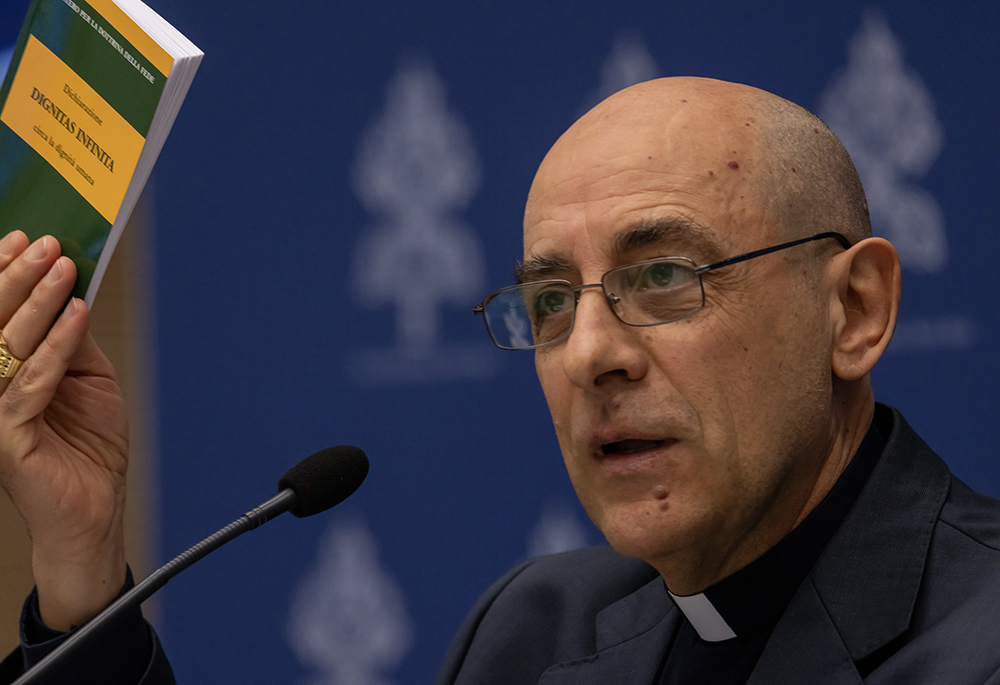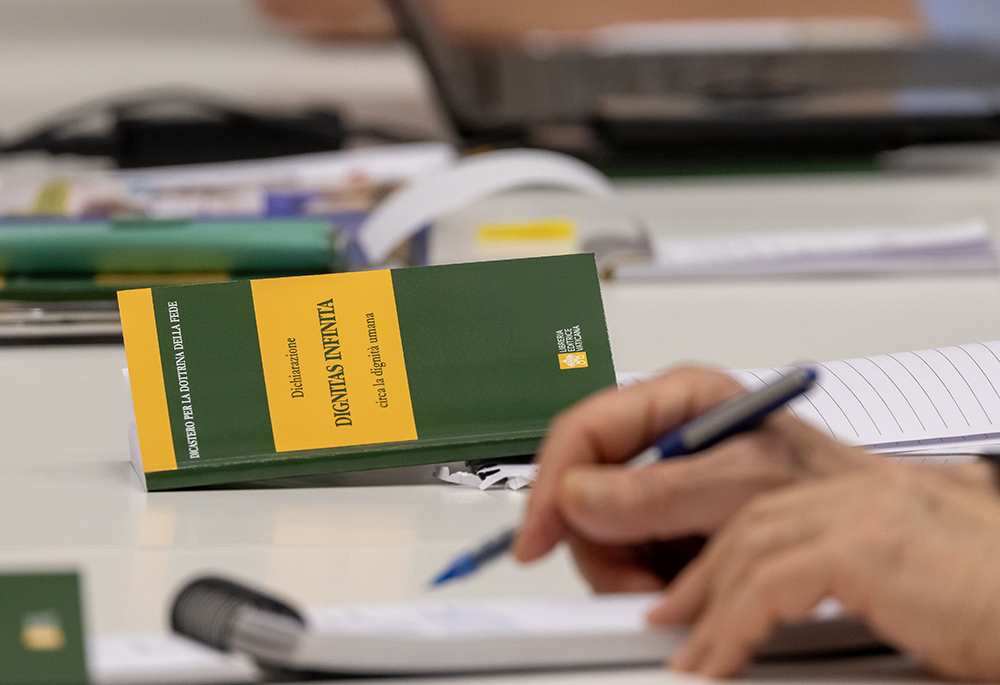
Cardinal Víctor Manuel Fernández, prefect of the Dicastery for the Doctrine of the Faith, holds up a copy of the dicastery's declaration, Dignitas Infinita ("Infinite Dignity") on human dignity during a news conference April 8 at the Vatican press office. (CNS/Pablo Esparza)
Dignitas Infinita, the Dicastery for the Doctrine of the Faith's recent document on human dignity, has provoked a variety of responses, very few of which reflect the kind of engagement with the church's teaching for which one might hope, especially where theologians and public intellectuals are concerned.
On the Catholic right, George Weigel was upset that among the document's 116 footnotes, not one was to St. Pope John Paul II's encyclical Veritatis Splendor. That might seem petty but it is instructive: A particular reading of that encyclical has been the American Catholic right's calling card for highlighting the concept and category of intrinsic evil, which they then apply to the realm of politics in ways that distort Catholic moral theology egregiously.
Fr. Raymond de Souza similarly linked the current text to the pontificate of John Paul II, but chose to engage the document in terms of public relations. After noting the problems with the rollout of Fiducia Supplicans in December, de Souza writes: "Immediately, Cardinal Fernández began to maneuver, promising another declaration on human dignity that would mollify critics, as if the DDF was engaging in Clintonian triangulation rather than proclaiming the splendor of the veritas. Thus came Dignitas infinita earlier this month." Alas, the introductory note explains that Dignitas Infinita has been in the works for years, making de Souza's analysis implausible.
On the Catholic left, almost all the responses have suffered from a congeries of problems. Several have tried to invalidate the entire text with a false claim, others invoke experience and/or science as a trump card, and most take profound umbrage at the document, as if Pope Francis had betrayed them. Let us take these one at a time.
"Dignitas Infinita shows no evidence that its authors were informed by true encounters with trans, nonbinary and intersex people," stated a group of theology students and alumni in an open letter to Pope Francis and Cardinal Victor Fernández. Holy Cross College theologian Mary Doyle Roche voiced a similar complaint: "The document notes the 'immense possibilities for encounter and solidarity.' … But the document reflects no such encounter with persons who are striving to live into the freedom to which they are called, a freedom that is not merely an exercise of control over body or identity, as the DDF suggests, but a freedom for authentic relationships with self and others." Francis DeBernado, executive director of New Ways Ministry, faulted the document for its "stunning lack of awareness of the actual lives of transgender and nonbinary people."
Many popes have voiced opinions on issues without meeting a person personally affected by whatever that issue is. Pope Francis is not one of them. We know he has met with and continues to nurture a relationship with a group of trans persons in Italy. It is not clear what constitutes a "true" encounter, the standard set in the open letter. Perhaps, an encounter that does not induce "false consciousness"?
Another line of criticism is that experience and science are trump cards, and that the Vatican document ignored both. "The Vatican's misunderstanding of 'gender ideology' and trans experiences is fundamentally unserious theology that offers only base caricatures of gender theory and science while denigrating the sacred lives of trans and other gender diverse folks," commented Jason Steidl, a teaching professor of religious studies. "Yet again, the many voices of trans people of faith, as well as contemporary sciences are ignored completely in favor of an outdated, heteronormative, and self-referential anthropology," said Mara Klein, a member of the German Synodal Path and activist.
Experience matters but in the making of theology, experience can never be the only thing that matters. We have canonical Scriptures. We have a theological tradition. We have an authoritative magisterium. More importantly, there is not a human alive who has not at least once made a choice that seemed obvious at the moment given his or her lived experience, but the decision turned out to be a disaster. The same is true for nations. Every culture has its blind spots. A whole people can be sincerely wrong. Nixon won twice.

Cardinal Víctor Manuel Fernández, prefect of the Dicastery for the Doctrine of the Faith, takes notes during a news conference to present the dicastery's declaration, Dignitas Infinita ("Infinite Dignity") on human dignity, a copy of which is nearby, April 8 at the Vatican press office. (CNS/Pablo Esparza)
The Vatican text acknowledged that "scientific coherence is the subject of considerable debate among experts." Appealing to "science" is complicated. As the Cass report for the National Health Service in the United Kingdom stated, "from the start, the Review stepped into an arena where there were strong and widely divergent opinions unsupported by adequate evidence." Dr. Hilary Cass is not a member of the Dicastery for the Doctrine of the Faith. Her empathy with "gender-questioning young people" is evident. The report runs to 388 pages, but reading the 25-page summary suffices to demonstrate that the science is muddled at best. Cass recommended the NHS not prescribe puberty blockers to adolescents and, instead, provide counseling. Anyone who invokes "the science" without reference to the Cass report is not being serious. It is remarkable that I could find no mention of the Cass report on New Ways Ministry's website.
Umbrage is the third characteristic of many of the criticisms of Dignitas Infinita, and not just umbrage but a deflecting umbrage. "With one breath, the document beautifully and powerfully declares that human dignity is infinite for all persons … and with another breath, it erases, invalidates, and — ultimately — violates the dignity of transgender persons," complained Emory University's Ish Ruiz. Fordham University theologian Cristina Traina voiced a similarly angry and dismissive verdict: "As others have remarked already, Dignitas Infinita's conclusions on sex and gender are sloppy and unfounded, which is insulting to LGBTQ Catholics."
The document clearly and repeatedly affirms the dignity of every human person. These critics seem to suggest it is impossible to affirm the dignity of the person without also accepting the critics' theories. As Pope Francis wrote to Sr. Jeannine Gramick, "Gender ideology is something other than homosexual or transsexual people." For the critics, alas, the gender theories of Judith Butler are treated as if they were more canonical than Matthew, Mark, Luke and John.
Advertisement
And the critics grow indignant if you do not agree. Reading through the postings at New Ways Ministry, it put me in mind of what Jason Blakely wrote in his book Lost in Ideology which I recently reviewed: "For the millions of people who are currently lost in ideology, political debate with opponents often consists of little more than bald assertions, condescension, haughtiness and moralizing. From deep inside a particular map, it appears self-evident that the world is necessarily 'thus and so.' Anyone unable to see by the blinding light of one's own ideological sun is benighted, irrational, wicked or otherwise false." That is precisely the way these invectives against Dignitas Infinita read.
This points to yet another point of controversy accentuated by Dignitas Infinita and the discussion that has followed, namely, what is gender ideology as the church understands it? That is a conversation for another day.
For now, it is enough to note how shrill the critics of Dignitas Infinita sound. They resemble nothing so much as the capitalist critics of this papacy, for example, the late Michael Novak and Fr. Robert Sirico, who objected to Pope Francis' forceful articulation of Catholic social teaching. How dare he? We Americans understand economics, not the poor benighted Argentine who only knows crony capitalism. He should have consulted us before he opened his mouth.
The ideologues of both gender and capital make the same appeal to human choice, self-definition and autonomy as transcendent values, but libertarianism in any guise is not compatible with Christian theology.








